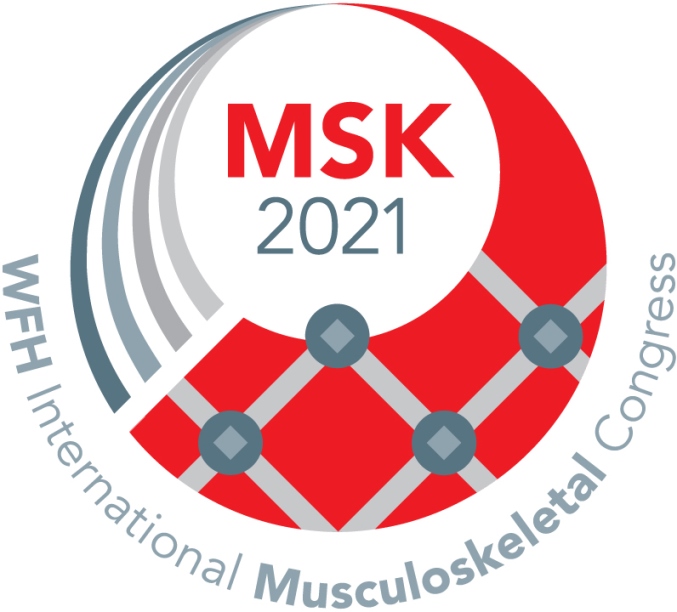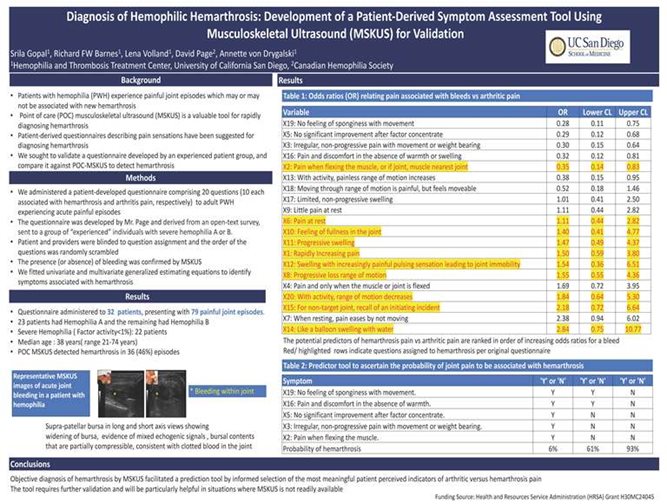BIANCA DA SILVA
Bianca Da Silva is Head of Paediatric Physiotherapy at John Hunter Children’s Hospital, Newcastle, NSW
This year MSK 2021, the 17th WFH (World Federation of Hemophilia) International Musculoskeletal (MSK) Congress, was presented in a virtual format. It featured a combination of educational sessions, free paper abstract submission and interactive workshops, focusing on the most current up to date knowledge on musculoskeletal approaches to bleeding disorders from experts all over the world and over 600 participants from 83 countries. There were 2-3 sessions per day over a 5 day period, with diverse start times, allowing attendees to participate in as many sessions as possible!
Topics discussed throughout the Congress included Scoring Systems, Physiotherapy, Surgery: Pre and Post, and Replacement Surgery: Tips and Tricks. The four workshops focused on clinical assessment, ultrasound, manual therapy and clinical cases.

Some of my personal highlights were the presentations about scoring systems and assessment tools.
Scoring Systems explored the frequently used assessment tools for haemophilia patients. This included the haemophilia joint health score, patient’s participation and activity scoring systems, x-ray, MRI, ultrasound, 3D motion analysis, and pre- and post-surgical assessments.
The Haemophilia Joint Health Score (HJHS) is the most common scoring system used in Australia. This is a validated outcome tool that assesses 9 items (including swelling, muscle wasting, crepitus, movement loss, joint pain and strength) in 6 target joints (elbows, knees and ankles).
Interesting concepts discussed during this session included the current use of ultrasound in the identification of an acute bleed, and the future possibility that a patient with haemophilia could perform this assessment with an ultrasound device in the convenience of their own home via telehealth with their treating Haemophilia Treatment Centre. There were also discussions regarding how in the future artificial intelligence could interpret results or identify changes by comparing previous images.
Current research indicates that T2 mapping MRI is a reliable technique for assessing changes of cartilage fibres over time. This is a type of MRI that is able to identify early changes in cartilage. It does this by detecting disarrangement in water molecules and collagen fibres. This would allow for an earlier and more preventative approach to joint degeneration and arthritis. Further research is required to determine whether T2 mapping can significantly predict cartilage damage prior to conventional MRI.
The authors of one poster had designed a Patient-Derived Symptom Assessment tool to determine from the patient’s answer to a number of questions whether an acute joint bleed was present. Particular questions were more helpful with identification of a joint bleed, and therefore provided a higher accuracy score. There has been considerable debate about how best to assess an acute joint bleed accurately. This assessment tool requires more investigation prior to being used in the wider community, however it shows great promise, and would be particularly useful for areas where ultrasound is not easily accessed.

Poster presented at MSK 2021, the 17th WFH International Musculoskeletal (MSK) Congress.1 Reprinted with permission from the authors. Click here to view PDF (1MB)
With new treatments and developments in gene therapy, we are all driving towards the goal of future generations growing up without joint bleeds and joint damage, and without limitations in sport or career choices. This will ultimately change the physiotherapy management of haemophilia, and ongoing screening or scoring systems will need to also adapt to incorporate these changes. This is a very exciting time in the world of haemophilia!
Thank you so much to Haemophilia Foundation Australia for supporting all Australian Haemophilia Treatment Centre Physiotherapists with their registration. It was such an honour to see some of my physiotherapy colleagues presenting at different sessions and sharing their expert knowledge and experience with the world.
REFERENCE
1. Gopal S, Barnes RW, Volland L, Page D, von Drygalski A. Diagnosis of hemophilic hemarthrosis: development of a patient-derived symptom assessment tool using Musculoskeletal Ultrasound (MSKUS) for validation. Poster presented at MSK 2021, the 17th WFH International Musculoskeletal Congress, May 2021.
Haemophilia Foundation Australia acknowledges the Traditional Owners and Custodians of Country throughout Australia, the land, waters and community where we walk, live, meet and work. We pay our respects to Elders past and present and extend that respect to all Aboriginal and Torres Strait Islander peoples.
Sign up for the latest news, events and our free National Haemophilia magazine